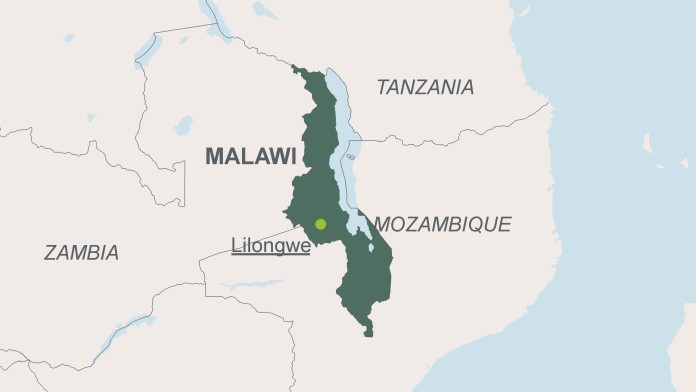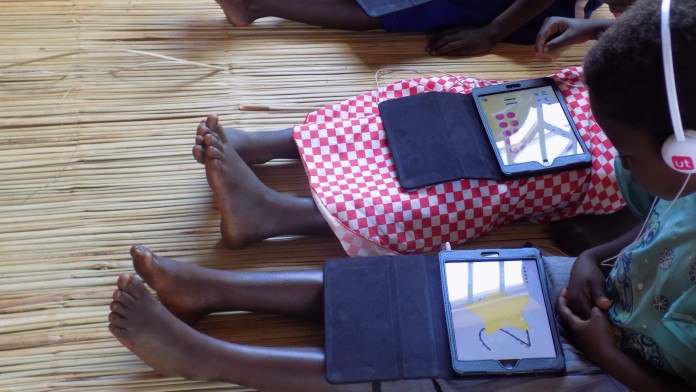
As of: 08/2020
How can you learn well in primary school when 250 pupils share a single classroom? When there is a lack of teachers and learning materials everywhere? Malawi is countering these enormous challenges in primary education with the "digital classroom". In the "Unlocking Talent" programme, primary school children from the second grade upwards are equipped with tablets in special learning centres to improve their arithmetic, writing and reading skills in a targeted manner. The aim: to unlock their talent with digital support. In addition, teachers are trained to use computer programs in their lessons. "Unlocking Talent" also gives a second educational opportunity to discouraged young people who had left the school system early.

In Malawi there is compulsory education for all children. Since 1994 the school fees for primary school have also been abolished. Nevertheless, the country still has a long way to go to achieve the goals of the national "Education for All" programme. In Malawi – as in all countries of the world – education has a considerable influence on the social and economic development of the country.
However, classrooms are overcrowded, there is a lack of well-trained teachers, supporting learning materials and the entire infrastructure is inadequate. One teacher alone must look after 80 to 250 school children. Aa a consequence, many pupils have to repeat their class – or even drop out of school completely.
The "Unlocking Talent" project aims to establish a total of 178 learning centres in the country by 2023. The learning centres will each receive an average of 46 tablets and will be equipped with their own solar power system to ensure that the tablets are reliably supplied with electricity. The project is financed by KfW Development Bank under the "Digital Africa" programme of the Federal Ministry for Economic Cooperation and Development. "Unlocking Talent" is the follow-up programme to a successful pilot project financed by Nor?way, among others. It had supported the quality of basic education in Malawi with digital components and had already established more than 100 digital learning centres.
“Unlocking Talent" is aimed primarily at pupils in the 2nd grade. Parallel to the lessons in the school classes, smaller groups can refine their skills in arithmetic, writing and reading in the digitally equipped learning centres, while for the other pupils the normal school lessons continue.
The second target group of the project are the teachers, who are to be introduced to learning with digital means. At eight Teacher Training Colleges in the country, future teachers will be trained to use tablets and computer programs in the classroom. In addition to the arithmetic, writing and reading programs that are intended for use in class, teachers can look at further learning content and get suggestions for their lessons.
The children can spend at least one hour per week at the learning centre. Guided by the virtual teacher in the app, they can, for example, draw letters on the tablet or solve arithmetical problems "playfully". The task of the real teachers is to keep an eye on all the children: those who are making rapid progress in learning and those who need further support. Especially for children with more potential, the digital classroom increases the chance of more and better education – a basic prerequisite for later entry into work and employment. And the others can receive additional support.
The evaluation of the predecessor project showed that the approach works. Not only did the children with tablet experience achieve better learning results than their peers without tablets. The absence problem – i.e. truancy – was also reduced considerably, especially during the teaching time in the learning centres. It is very likely that the stimulatingly designed learning apps contributed to this, as did well-trained people who were able to solve technical problems. The appreciation of teachers, schoolchildren and their parents for the programme was also reflected in the fact that all tablets were stowed theft-proof.
Whether the potential of "Unlocking Talent" will be accepted beyond the schoolyard depends not least on the extent to which the communities in which the learning centres are being established identify with the project. This is important because even older young people who have ended their school careers prematurely and full of frustration can find a way back into learning in these centres. But also adults who did not receive any schooling can benefit from "Unlocking Talent" and go to school here in the evening
An accompanying study will evaluate the follow-up programme. Two comparison groups will be observed - one group with and one without a digital classroom. It will then be seen whether the good learning results from the pilot phase can be repeated. If the results turn out as expected, "Unlocking Talent" can be transferred to other African countries.
The project contributes to the achievement of these following United Nations Sustainable Development Goals:
KfW Group
KfW Development Bank
+49 69 7431-0
www.kfw-entwicklungsbank.de
Health, Education and Social Security, Southern Africa
Deparment for Digitalisation, Innovation and Communication